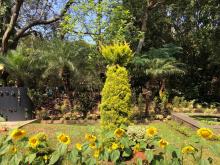
Abstract: India recognises nuclear energy as one of the inevitable options in its energy mix to meet the ever-increasing demands for sustainable economic growth. India also extensively uses ionising radiation and radioactive isotopes for societal applications in medicine, agriculture, industry and research. India has given equal importance to establishing a viable framework for nuclear security. India's nuclear industry and research centres have internalised security practices in their day-to-day work and have created a strong security culture in their respective organisations. For nuclear security, India has adopted a Risk Reduction approach whereby attempts are made to bring risk to an acceptable level. India's approach to nuclear security consists of governance and national legal framework, institutions and Bodies, International legal obligations, technology and nuclear security, augmenting human resources, nuclear security practice and culture.
The speaker will highlight the Details of nuclear security architecture in India, Nuclear safeguards and ensuring nuclear security, Securing other radioactive substances and the challenges and opportunities.
About the speaker: Dr. K.L. Ramakumar is a distinguished scientist who has served the DAE with distinction for more than 40 years. At the time of superannuation, he was Head of the Nuclear Controls & Planning Wing (NCPW), DAE and Director of the Radiochemistry & Isotope Group, BARC. His expertise in nuclear technology encompasses all the stages of the nuclear fuel cycle, nuclear safeguards, nuclear safety and security.
Dr. Ramakumar played an important role in negotiation meetings for civil nuclear cooperation with the USA. He also contributed to finalise the civil nuclear cooperation agreements with France and Canada. He was a member of the Indian team that negotiated an India-specific safeguards agreement and an additional protocol with the IAEA. He was an expert member of the High-Level Fissile Material Cut-Off Treaty Experts Preparatory Group, a Group of Government Experts meeting on the role of nuclear disarmament and verification in advancing nuclear disarmament.
During his tenure as Head, NCPW civil nuclear cooperation agreements with Russia, Argentina, Kazakhstan, Australia, Sri Lanka, UK, Japan, and Vietnam were also finalised/entered into force.
Dr. Ramakumar was a member of "The Standing Advisory Group on Safeguards Implementation (SAGSI)", IAEA and served as a member of the "Advisory Group on Nuclear Security (ADSEC)", IAEA. Dr. Ramakumar was on an expert assignment at the Safeguards analytical laboratory of IAEA to establish mass spectrometry calibration procedures. He had been the co-convener of the nuclear law course conducted by HBNI on three occasions.
He has delivered several talks on policy-related topics, including nuclear safeguards as a powerful tool for ensuring nuclear safety and security, nuclear forensics, nuclear security and national requirements in global governance.
Dr. Ramakumar has been a senior professor of chemical sciences and strategic studies at HBNI. He has published more than 500 scientific publications. He is an adjunct professor at NIAS..
